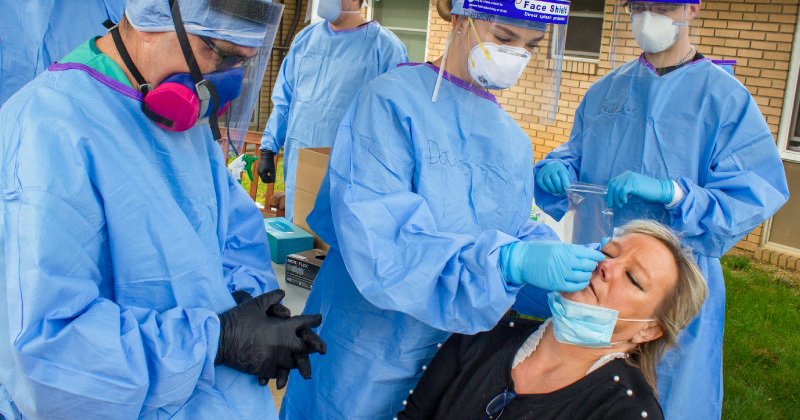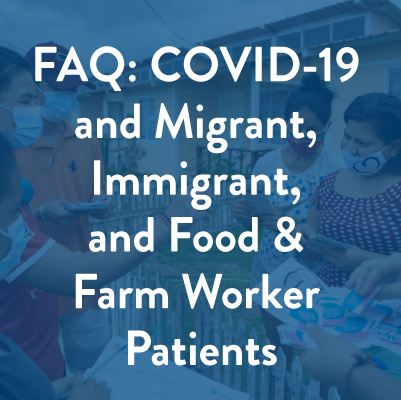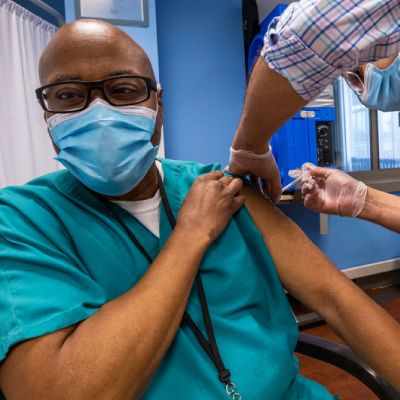- Who We Are
- Clinician Employment
- Publications
- Witness to Witness (W2W)
- Kugel & Zuroweste Health Justice Award
- Your Voice Matters: Photovoice Project
Dr. Zuroweste, TB Expert, Calls for Increase in Public Health Resources as COVID-19 Draws Resources Away from TB
Thu, 08/06/2020 | by MCN Admin


Tuberculosis kills over 1.5 million people, every year. As the COVID-19 pandemic rages on, TB experts are gravely concerned that the already unacceptable number of annual deaths from TB is going to grow. Ed Zuroweste, MD, Founding Medical Director of Migrant Clinicians Network, attends to TB patients at seven county health departments in Pennsylvania and oversees the entire state’s TB program -- and he’s worried. “In my largest TB clinic, I’d usually see about 20 patients, and about 10 to 15 of those would be LTBI patients, each month,” Dr. Zuroweste said. “This month, I saw three. The month before, I saw two, and the month before – zero.”
At health departments across the country, suspected LTBI patients – those who have a dormant TB infection, but are not actively ill or spreading the disease – come to health department clinics for screening and treatment. But new patients are not coming in. Patients are typically referred to the health department from a community health center or private practice. Nurses at those facilities, however, are overwhelmed; fewer patients are being referred. Among those who are referred, some are refusing to come to the health department, for fear of contracting COVID-19. And, for those who do arrive at the health department, they are unable to get screened. “Our nurses are working six days a week, so the health department is covered for seven days a week,” explained Dr. Zuroweste. “But so much of their time has been diverted to contract tracing for COVID, that they don’t have time to do their normal duties.” The already overburdened staff is unable to keep up: “We’re getting behind on TB infections,” he said.
“It’s too early to know what impact it’s going to have on TB disease,” Dr. Zuroweste clarified, but he points to the CDC’s newly released Morbidity and Mortality Weekly Report (MMWR) on TB, which demonstrates that what Dr. Zuroweste is seeing in Pennsylvania is occurring nationwide. The MMWR, Notes from the Field: Effects of the COVID-19 Response on Tuberculosis Prevention and Control Efforts — United States, March–April 2020, states that 60 to 72 percent were experiencing partial or high impact on staffing capacity. The MMWR concludes that “the United States will need to address the backlog of population health services that have been delayed or not done while public health resources are focused on COVID-19. The US domestic TB elimination program is one example. If essential TB program activities are not sustained, gains made in reducing US TB cases will be at risk.”
COVID-19 has disrupted efforts against TB worldwide. Giorgio Franyuti, MD, MCN Board Member told the New York Times that “nobody is testing for TB at any facility. The mind of clinicians in Mexico, as well as decision makers, is stuck with Covid-19.”
Stop TB USA responded to the MMWR, calling for the strengthening of public health programs to fight the co-pandemics: “Stop TB USA appeals to the public and lawmakers to ensure that the TB programs continue, without interruption. Increased funding is needed to strengthen efforts to identify, treat and prevent TB, including drug resistant strains and latent TB infection.”
Dr. Zuroweste agreed. “Public health needs a substantial increase – we need to understand the importance of funding. Without good public health, any sort of infectious disease, epidemic or pandemic, is not going to be handled as well as it should be, and will have huge economic impact on the whole country.”
“We were already just hanging on, keeping TB at bay,” he added. “The concern is we’re going to have another resurgence of TB cases because of this diversion of resources.”
Like what you see? Amplify our collective voice with a contribution.
Got some good news to share? Contact us on our social media pages above.
Return to the main blog page or sign up for blog updates here.







